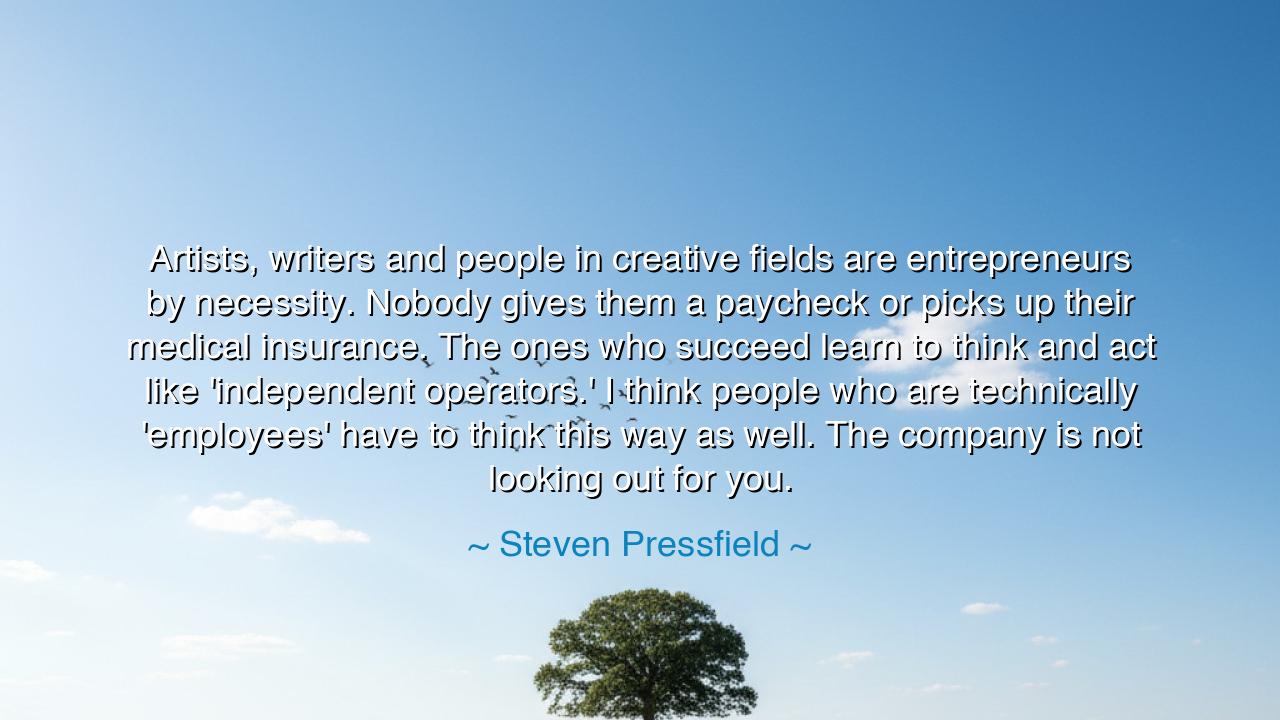
Artists, writers and people in creative fields are entrepreneurs
Artists, writers and people in creative fields are entrepreneurs by necessity. Nobody gives them a paycheck or picks up their medical insurance. The ones who succeed learn to think and act like 'independent operators.' I think people who are technically 'employees' have to think this way as well. The company is not looking out for you.






The words of Steven Pressfield—“Artists, writers and people in creative fields are entrepreneurs by necessity. Nobody gives them a paycheck or picks up their medical insurance. The ones who succeed learn to think and act like ‘independent operators.’ I think people who are technically ‘employees’ have to think this way as well. The company is not looking out for you.”—strike like a hammer upon the anvil of modern life. These are not gentle words; they are a summons to wakefulness. Pressfield reminds us that those who dwell in the realm of creation—artists, writers, creators—live without the safety nets others may take for granted. Their survival depends not on the goodwill of an employer, but on their own will, their own vision, and their ability to forge paths where none yet exist.
In these words, we hear echoes of the ancient artisan, the wandering poet, the philosopher who taught not for salary but for sustenance. The bard of old was paid in coin or bread, the sculptor carved at the mercy of patrons, and the dramatist lived only if his works could move the hearts of the crowd. This is the eternal truth: the creator has always been an independent operator, sustained by courage and perseverance. The world may consume their art, but it does not guarantee their survival. And so, they must learn to live as warriors of the spirit—entrepreneurs of their own destiny.
Pressfield also warns that this truth is no longer confined to the creative fields. In our age, even the so-called employee is not secure. The company, like the ancient court, may shower favor today and withdraw it tomorrow. To depend entirely upon the goodwill of such powers is folly. Just as the legionary must be prepared even when his commander falters, so must the worker be ready to stand alone. In this teaching lies both sobering reality and liberating strength: if no one is truly looking out for you, then you must look out for yourself.
History provides us with a shining example in the life of Michelangelo. Though supported at times by the wealth of popes and princes, he was ever an independent operator at heart. He defied patrons, quarreled with masters, and carved his visions even when others demanded compromise. Had he lived as a mere servant of his employers, the Sistine Chapel would never have been born, nor the David risen from stone. His survival depended not on the benevolence of others, but on his willingness to endure hardship and labor fiercely for his art. Thus, Michelangelo embodies the very spirit of Pressfield’s teaching: that one must be both creator and entrepreneur, both dreamer and builder of one’s own sustenance.
The emotional weight of this teaching is heavy yet empowering. For it reminds us that life is not a path lined with guarantees. To wait for protection is to wait forever; to hope for security from others is to live in chains of disappointment. But to embrace the role of independent operator is to claim both burden and freedom. Yes, the burden is great: one must plan, adapt, sacrifice, and fight for one’s place. Yet the freedom is greater still: one becomes master of one’s own course, unchained from false promises.
What, then, is the lesson for us? It is this: live as if you are your own keeper. Whether artist or worker, entrepreneur or employee, do not surrender your fate entirely into the hands of others. Build skills that endure, cultivate resilience, and learn to adapt when the winds change. See yourself not as a dependent but as a sovereign—capable of creating, of sustaining, and of navigating uncertainty with strength.
Practical steps follow this wisdom. Save and prepare as though no employer will rescue you. Create side ventures, nurture talents beyond your main occupation, and think with the independence of one who could stand alone if needed. Above all, do not wait passively for fortune to provide; instead, labor each day as an entrepreneur of your own destiny. For whether in the field of art or in the halls of business, those who endure are those who live with the mind of independence and the courage of self-reliance.
Thus, Pressfield’s words shine like an iron torch in the night: do not wait for the company, for the state, for the patron to save you. Live as an independent operator, and in this, you will discover both your strength and your freedom. This is not only the way of the artist, but the way of all who wish to live with dignity in a world that promises nothing but the chance to struggle. And in that struggle, the noble soul finds its greatness.






AAdministratorAdministrator
Welcome, honored guests. Please leave a comment, we will respond soon